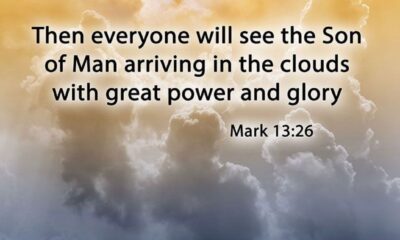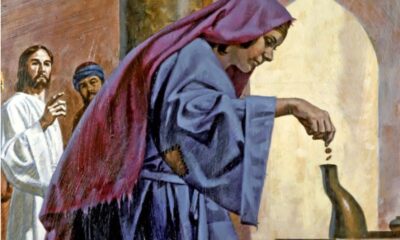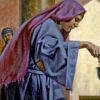READINGS: 1st Reading: 2kgs 4: 42-44: They will eat, and have some left over. Thank you God
Resp. Ps.144: You open wide your hand, O Lord and grant our desires.
2nd Reading: Ephesians 4:1-6: one Body, one Spirit, one Lord, one faith, one baptism, one God.
Gospel: John 6:1-15: The feeding of the five thousand
REFLECTION
“The eyes of all creatures look to you and you give them their food in due time.” Ps. 145:15.
1. These words from the Responsorial Psalm set for today may remind us of grace being said before meals. The practice of saying grace before and after meals is one of many Catholic habits that seem almost to have died out in our world of fast food and television and online suppers. Perhaps this is one of a number of factors that have contributed to a diminishing sense in the world that we are sustained in our daily lives by the providence of God. Maybe it would be a good idea to discuss today to consider whether to reinstate grace in your household, if it has fallen out of use?
2. You may have noticed that although we are in the Year of Mark-Year B of the three year cycle-the Gospel passage at Mass today was from Saint John’s. John’s Gospel is shot through with eucharistic ideas and glimpses. In it, we have the great discourse of Jesus, “ I am the bread of life…”There are many sacramental hints-the wine at the marriage feast of Cana, the passion and death of our Lord Jesus Christ at the same time of the slaying of the Passover lamb in the Temple; the blood and water flowing from the spear wound on Our Lord’s side on Calvary. And today, the story of the multiplication of loaves and fish and the feeding of the crowd by the Lake of Galilee.
3. Speaking of “the multiplication of loaves” makes the gospel sound like a mathematical activity. “The feeding of the five thousand “ begins better to convey God’s providence at work. Our Lord’s sensitivity to the material and spiritual needs of the crowd led Him to feed them. Saint John recounts how Jesus took the loaves, gave thanks, and gave them out to those who were there. All were satisfied. Notice the actions of Our Lord. He took the bread, gave thanks and gave it to the crowd. These actions form a familiar sequence. Later in the Mass we shall hear them: “He took bread and gave you thanks, he broke the bread, gave it to his disciples and said, ‘Take this, all of you and eat of it.”
4. As Catholics we believe that in the Mass the bread and wine on the altar become the Body and Blood of Christ. This transformation is difficult for an agnostic or atheist person to imagine, for as St. Thomas put it, “faith our outward sense befriending makes the inward vision clear.” It is not provable by scientific method. But we know, in the most profound possible way, through revelation by God, that in receiving Holy Communion we receive food richer and more nourishing than any meal we might sit down to eat in the dinning or banqueting hall.
5. A Medieval Latin liturgical text, O quantum suavis, expresses well an appropriate Catholic sense of wonder and gratitude for the gift of Holy Communion. How gracious is your Spirit, O Lord, who, to show your loving kindness towards your children, have given the sweetest bread of heaven. You fill the hungry with good things and send the discontented rich away empty.” But Holy Communion, wonderful gift though it is, forms only one aspect of the Mass. To be fed with such divine generosity is amazing, but our whole salvation is summed up in the celebration of this sacrifice day by day in our churches.
6. Considering whether to say grace before and after meals is important because it can focus our hearts and minds on how God sustains every aspect of the world and our lives, in which the food we eat plays it’s part. But cultivating a spirit of thanksgiving for all that God gives us in the Mass is even more important. We are reminded of this by the fact that the Ancient Greek name, Eucharist, itself means Thanksgiving.
7. The quiet moments after receiving Holy Communion form a perfect time specifically to thank God for Holy Communion itself-the spiritual food we take into our bodies and souls. Traditional devotions and spontaneous silent prayer in the heart each have their place.But our whole lives should be Eucharistic in two senses. First, they should be focused on the Mass as the point where every Sunday and Holy Day, and every weekday too if we are able to attend Mass daily, the saving work of Christ is set out before us on the altar and touches our very being. Even if we cannot attend Mass, the sight of a Catholic Church or a moment of thought reminds us that the Mass is offered daily in most parishes. Secondly, our lives should be eucharistic in the sense that they are filled with thankfulness to God for his generosity to us, for the many gifts we receive, the Mass foremost among them. The young boy offered his gifts of five barley loaves of bread and two fish and God multiplied it so it is with us when when we offer ourselves to God we become thanks givers offering Christ to the Father who is equally the offerer.
Read More: Fourteenth Sunday In Ordinary Time Year B 27-6-2021https://agnesisika.com/prophet-fourteenth-sunday-in-ordinary-time-year-b-27-6-2021/
8. In Penal times in England, priests and people risked their lives to celebrate Mass; it was the same in the early Church under persecution, and in some countries behind the Iron Curtain in the 29th century. Nowadays it is all too easy to take the Mass for granted, or even forget about it during the week, or even take little notice when we are present at the celebration of Mass. God forbid that we should become so slipshod and ungrateful. The way to avoid such a sin of ingratitude and neglect is to cultivate a spirit of awareness and thankfulness for all God’s blessings, day in and day out. To restore the habit of saying thank you to God for the daily food which sustains our bodies. And to develop a profound practice of thanksgiving for the Mass and for Holy Communion, our salvation made visible and tangible, and the food nourishes our souls.
Stay safe
Shalom
Osho
































